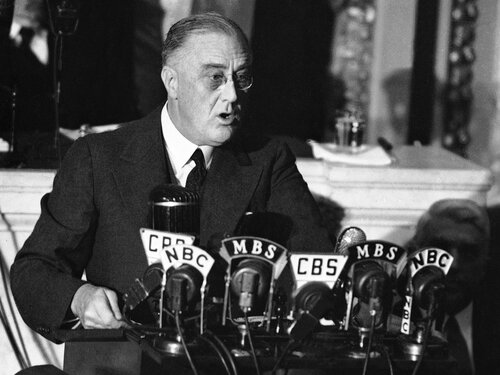
So Hillary Clinton has formally (choose your favorite verb) launched/rebooted/re-packaged/re-introduced her presidential campaign in a Saturday speech on New York City's Roosevelt Island.
My question going into the event: which Roosevelt would she channel in making her case to be America's 45th president?
Choice A: Eleanor Roosevelt, for whom Mrs. Clinton has long expressed an affinity as a fellow First Lady (some reporters speculated that Hillary's "Scooby" ride through Iowa was inspired in part by Eleanor's famous jaunt in a Buick Roadster).
Choice B: Theodore Roosevelt and his rough-riding progressivism of 110 years ago - spirited anti-corporate rhetoric (Hillary's even shown a willingness to appropriate one of T.R.'s more famous phrases ("in the arena")).
Where she landed, of course, was the obvious choice all along: Franklin Roosevelt.
As with FDR in his two Depression-era presidential campaigns, Hillary used the event to demonstrate empathy and her desire to unleash unrealized potential on the domestic front, as the New Deal promised in the 1930s.
Here’s video of the event:
But a word of caution about emulating FDR - or any Roosevelt, for that matter.
The temptation is to cut-and-paste the Roosevelts' words, applying them to modern-day problems. Indeed, Hillary Clinton fell into this trap.
Here's how:
The exact venue for her kickoff was Four Freedoms Park, on the southern tip of Roosevelt Island (a good place to keep outsiders from crashing an event). The park commemorates one of FDR's more storied speeches, his address to Congress on Jan. 6, 1941.
The "four essential human freedoms" that Roosevelt listed that day:
1) "freedom of speech and expression - everywhere in the world"
2) "freedom of every person to worship G0D in his own way - everywhere in the world"
3) "freedom from want . . . economic understandings which will secure to every nation a healthy peacetime lifetime for its inhabitants . . ."
4) "freedom from fear . . . a worldwide reduction of armaments to such a point and in such a thorough fashion that no nation will be in a position to commit an act of physical aggression against any neighbor . . ."
In her speech, Mrs. Clinton listed not "four freedoms" but "four fights" (as she has been, for some time on the campaign trail) - strengthening the economy, strengthening families, increasing opportunities, and renewing democracies. And she talked about America’s “unfinished business”, which she led the audience to believe was also at the heart of FDR “four freedoms”.
Which is all fine and swell, but not exactly what Franklin Roosevelt had in mind in January 1941.
Coming off an election in which he promised not to send American boys into foreign wars, FDR used the appearance before Congress to make a pivot. Almost eleven months to the day before Pearl Harbor, he was now hard-selling reluctant members on the need for a rapid military buildup, while slow-walking the nation into the concept of America's intervention in global affairs as a moral imperative.
Yes, there was a domestic component to the speech. But if you read it carefully, you’ll see that FDR’s greater focus was the moral argument in favor of foreign entanglements (just as Roosevelt’s relationship with Winston Churchill was fraught with religious overtones).
"Freedom from fear", vintage 1941, was a reference to fascism on the march, not escaping student-loan debt.
"Freedom of speech and expression" referred to Nazi persecution, not Caitlyn Jenner's sex change.
Perhaps Roosevelt would see eye to eye with Mrs. Clinton’s domestic vision. But in 1941, he was looking a world melting down, even if the violence was reaching America’s shores, and trying to swim against the political current. The nagging sense, after listening to the Hillary 2016 kickoff, is she isn’t looking at the inevitability of future war and entanglement (or maybe she can’t publicly say so, given that it raises all sorts of uncomfortable questions about her role in Obama foreign policy).
In fairness, Hillary Clinton isn't the only presidential candidate going down the historical rabbit hole in this election. Earlier this month, in a campaign appearance in Andover, Mass., Texas Sen. Ted Cruz claimed that John F. Kennedy "would be a Republican today" as there's no home in the modern Democratic Party for a pro-growth tax-cutting presidency.
However, it's Mrs. Clinton's use of FDR's legacy that's more bothersome, as it gets to the heart of the Democrats' challenge in the 2016 election - in trying to succeed an anti-interventionist president whose foreign policy is in a state of free-fall, what will be the Clinton standard for overseas engagement? Red line, blurred lines, or no lines at all?
Once her New York event was over, Mrs. Clinton immediately hit the campaign trail, presumably without a cigarette holder dangling from her lips or a Scottish Terrier by her side. But that won't stop her from invoking FDR if it better connects her to fellow Democrats.
Which suggests that, in 2016, the only thing we have to fear is . . . a candidate who selectively edits Franklin Roosevelt.
Previously:
• 06/11/15: Thursday Candidates Quiz
• 06/10/15: First Best Second Choice
• 06/08/15: Game of Inches
• 06/03/15: The Power Of Narrative Politics
• 06/01/15: Sorting The Republicans' 2016 Kingdom
• 05/28/15: To Command Without Having Served
• 05/21/15: 2016: Do Looks Matter?
• 05/15/15: John Bolton's Swan Song
Comment by clicking here.
Bill Whalen is a research fellow at the Hoover Institution, where he studies and writes on current events and political trends. In citing Whalen as one of its "top-ten" political reporters, The 1992 Media Guide said of his work: “The New York Times could trade six of its political writers for Whalen and still get a bargain.” During those years, Whalen also appeared frequently on C-SPAN, National Public Radio, and CNBC.


 Contact The Editor
Contact The Editor
 Articles By This Author
Articles By This Author
